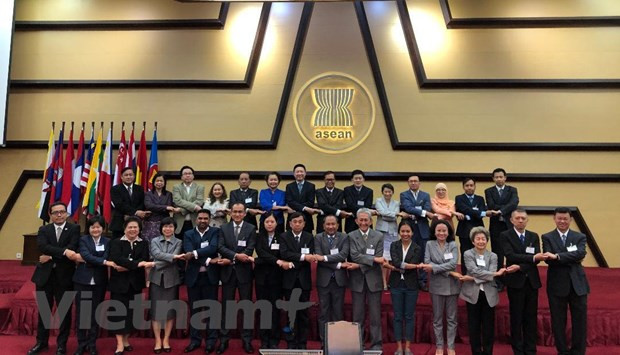 Participants in the 11th Coordinating Conference for the ASEAN Political-Security Community pose for a photo (Photo: Vietnam's permanent mission to ASEAN)
Participants in the 11th Coordinating Conference for the ASEAN Political-Security Community pose for a photo (Photo: Vietnam's permanent mission to ASEAN)Jakarta (VNA) – The 11th CoordinatingConference for the ASEAN Political-Security Community (APSC) took place at theASEAN Secretariat’s headquarters in Jakarta on March 5 to review theimplementation of the APSC Blueprint 2025.
The event was attended by representatives of the10 member countries, 18 specialised agencies of the bloc and the ASEANSecretariat. The Vietnamese delegation was led by Ambassador Tran Duc Binh,head of the country’s permanent mission to ASEAN, along with officials from theministries of foreign affairs, national defence, public security and justice.
Participants noted the strides in all four areasof the blueprint with 258 or 89 percent of the 290 action lines implemented.That has helped improve living standards, while consolidating law-governed states,legal systems and judicial foundations to build a rules-based andpeople-centred ASEAN community.
The ASEAN countries have ratified and enforcedthe ASEAN Convention Against Trafficking in Persons, approved the Guidelines onConsular Assistance by ASEAN Member States’ Missions in Third Countries toNationals of Other ASEAN Member States, opened an ASEAN judiciaries portal, andset up ASEAN lanes at some airports.
The bloc has also carried out cooperationactivities relating to fighting terrorism and drug and human trafficking;ensuring nuclear security and safety and cyber security; humanitarian aid anddisaster relief; and marine safety and security.
Its relations with partners have been enhanced,officials said, adding that ASEAN’s central role in the regional architectureand regional cooperation is widely respected.
In November 2018, ASEAN lifted its dialoguerelationship with Russia to a strategic partnership and agreed in principle toelevate ties with the EU to the same level.
Many countries have expressed their wish toestablish partnerships with the bloc like Bangladesh, Sri Lanka, Morocco, theUnited Arab Emirates, Chile and the Democratic People’s Republic of Korea. Sofar, 90 countries and organisations have sent ambassadors to ASEAN, which inturn has set up 54 committees in third countries and major internationalorganisations.
ASEAN-led cooperation mechanisms and frameworks,including the East Asia Summit, the ASEAN Plus One, the ASEAN Plus Three, theASEAN Regional Forum, and the ASEAN Defence Ministers’ Meeting Plus, have promoteddialogue, built trust and contributed to joint efforts to resolve problems ofcommon concern, according to the meeting.
The meeting also applauded the progress innegotiations on a Code of Conduct in the East Sea between ASEAN and China.Participants also reiterated the importance of maintaining peace, stability,security and navigation and aviation safety and freedom in the East Sea, andsettling disputes by peaceful means and on the basis of international law,including the 1982 United Nations Convention on the Law of the Sea.
Discussing future cooperation, participants saidmember nations and specialised agencies should keep making efforts to carry outall action lines of the APSC Blueprint 2025 and strengthen connectivity amongthe ASEAN Community. They also underlined the need to intensify coordinationamong agencies, especially in inter-sectoral and inter-pillar issues.
The APSC Blueprint 2025 was approved on November21, 2015, with a view to building an APSC by 2025 in four main areas: arules-based, people-oriented and people-centred community; a peaceful, secureand stable region; an outward-looking community that deepens cooperation withexternal parties, and upholds ASEAN centrality in the evolving regionalarchitecture; and a community with strengthened institutional capacity.
The APSC is one of three pillars of the ASEAN Community, which also includes the ASEAN EconomicCommunity and the ASEAN Socio-Cultural Community.-VNA




























